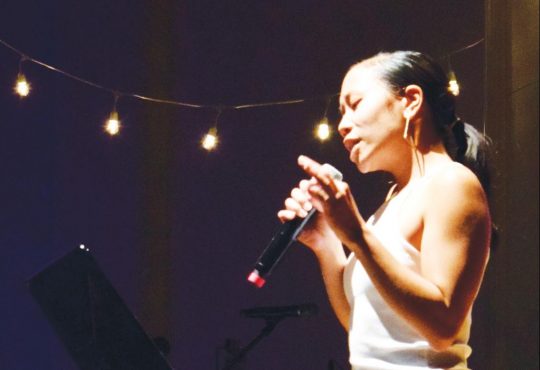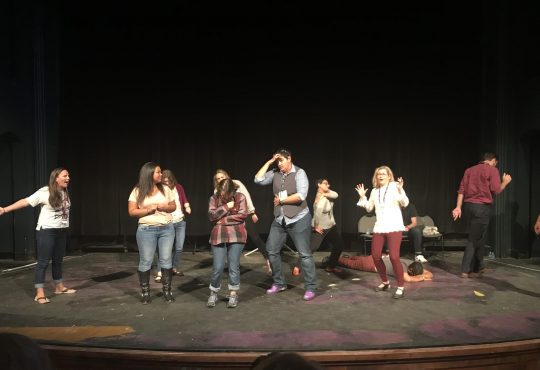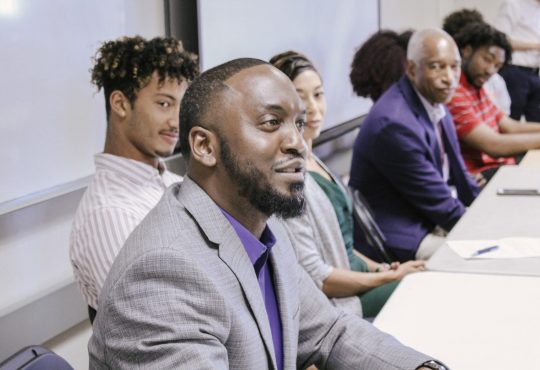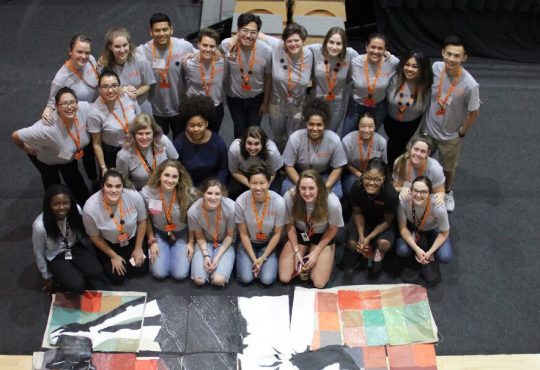
On the evening of Thursday, Sept. 27, 2018 the Race and Pedagogy National Conference began with a ceremony from the Canoe family of the Puyallup tribe. Adults and children performed a song to commence the conference. They danced through the aisles as drums played, finally gathering on stage. After a series of opening comments by Professor Dexter Gordon, President Crawford, Chaplain Dave Wright and Tacoma mayor Victoria Woodards and a musical interlude from The Tacoma Refugee Choir, the keynote began.
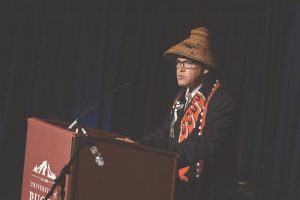
Brian Cladoosby
“My goal as a local and national leader is to destroy historical trauma one generation at a time,” Brian Cladoosby, the keynote speaker, said. Attendees of the conference gathered at the Fieldhouse to begin the project of “Radically Re-Imagining the Project of Justice,” the main theme of the conference.
Cladoosby is the chairman of the Swinomish Indian Tribal Community and formerly served as the president of the National Congress of American Indians. Cladoosby advocates for Native communities nationwide, publicizing the trauma of Native people’s experiences and speaking against oppression.
Cladoosby began his speech by discussing the whitewashed history of the United States and the failure of schools to teach a full history that represents all groups.
Cladoosby also spoke out against Columbus Day, saying that it should be remembered as a tragic day, one that represents genocide.
Most of Cladoosby’s speech was centered around trauma: that of genocide and colonization, Native boarding schools and the effects of abuse and addiction.
Cladoosby expressed his mission to end generational trauma caused by the mental and physical tolls of oppression. He spoke about his personal experiences with alcoholism and drugs, a problem that deeply affects Native American communities. He proudly talked about his own family and the fact that both his daughters are drug- and alcohol-free. He reiterated that ending trauma means working intergenerationally.
Cladoosby attributed some of the strife facing Native American people to the boarding schools that the children were once forced to attend. He referred to the students of the schools as “prisoners of war” and called the boarding schools “internment camps.”
He went on to say that the boarding school system damaged Native American communities in a long-lasting way. He said that education was formerly the problem but is now the solution.
“It’s ironic that education caused historical trauma. … It’s ironic that education destroys historical trauma,” Cladoosby said.
Throughout his speech, Cladoosby reinforced the importance of education, the necessity of teaching a history that is not dominated by a white Eurocentric perspective.
He ended his speech by giving advice: “One thing you can do is advocate for real history taught in schools,” he said.
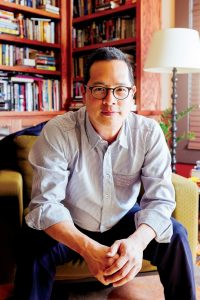
Jeff Chang
On Friday morning, Sept. 28, the iconic Kendrick Lamar lyric and the title of Jeff Chang’s most recent book, “We Gon’ Be Alright,” was projected onto the screens in the Memorial Fieldhouse. Chang began his keynote speech by discussing if we, as a nation, would be alright.
Candid with the audience, Chang described the difficulty of talking about a book titled “We Gon’ Be Alright” when “every day, especially this week, they seem to bring us new evidence that things are not.”
But then he spoke about the lyrics to Lamar’s song: .“Most of the song is about struggle! But then you get to the chorus, right, and against all odds, the chorus is optimistic. It’s a leap of faith, it’s a leap of imagination, and it’s a reminder that the power of our imagination can outlast the thoughts of darkness, and take us to a brighter day,” he said.
“We’re in the era of the culture wars, a struggle over competing narratives,” Chang said. He summarizes this struggle into two conflicting narratives of America: the story of an America in decline, in need of restoration, and the story of an America that is still trying to be born, that we are trying to bring to life.
Chang went on to discuss the resegregation of America, asking the audience, “How do we rupture the narratives that contain us and divide us and further the inequality between us?” He highlighted housing segregation and displacement, school segregation, and the expansion of cultural inequity, insisting the only opportunity for progress was to develop a collective imagination for change.
“Most of the song is about struggle! But then you get to the chorus, right, and against all odds, the chorus is optimistic. It’s a leap of faith, it’s a leap of imagination and it’s a reminder that the power of our imagination can outlast the thoughts of darkness and take us to a brighter day,” he said.
Puget Sound sophomore Carly Cashen spoke of the impact Chang’s speech had on her: “Jeff Chang spoke a necessary truth today: ‘Privilege shows up as disengagement.’ And he’s right. We need to show up and be empathetic and stand up against ‘the machines of domination’ and engage,” Cashen said.
Chang concluded his speech by calling us all, especially young people, to action: “This is your time.”
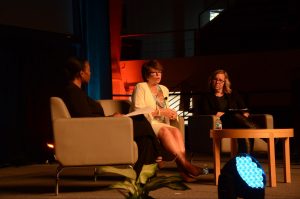
Valerie Jarrett
Later Friday afternoon, former government official Valerie B. Jarrett took the stage in the Memorial Fieldhouse to deliver the third keynote of the conference. The event was styled as a conversation rather than a lecture and Jarrett was joined onstage by Puget Sound politics and government professor Alisa Kessel and African American studies professor Renee Simms.
With many notable accomplishments, including being the longest-serving senior advisor to President Barack Obama, a Senior Distinguished Fellow at the University of Chicago Law School and the Board Chair of When We All Vote, Jarrett had plenty of insight and advice to share with the audience.
She touched on a variety of pressing issues throughout the conversation, including voter participation, prison reform, the Black Lives Matter movement, Judge Kavanaugh, #MeToo and It’s On Us.
Jarrett began the conversation by answering the question, “How do you characterize this political moment in the United States?” She shared mixed sentiments, saying, “I think the good news is that you guys are in the middle of a transformative time. Some of it’s good, some of it’s challenging, most of it’s hard. But change has always been hard in our country.”
She went on to talk about the inevitable tensions that come with change and what we can do to ensure positive changes in the future. Her primary focus? Jarrett wants to change the culture around voting, and she’s doing just that through work with When We All Vote, a non-partisan, non-profit effort to bring out the vote.
When We All Vote utilizes the star power of its co-chairs (including Michelle Obama, Tom Hanks, Lin-Manuel Miranda and Faith Hill) to reach mass audiences and fulfill its mission of “sparking a conversation about our rights and responsibilities in shaping our democracy,” with a focus on increasing voter registration and participation, according to whenweallvote.org.
Jarrett addressed the audience, which was made up of various age groups, but paid special attention to the youth present. She acknowledged the popular sentiment that one’s vote does not matter, arguing that “your vote gives you voice; your voice gives you power.”
Jarrett highlighted the recent confrontation between Arizona senator Jeff Flake and two women who were survivors of sexual assault and shared their stories with Flake, leading him to support a delayed vote in the Kavanaugh confirmation. Using this example, Jarrett stressed the power that ordinary people possess, that there is no office more important than that of the citizen.
Like Chang, Jarrett urged the audience to become engaged and educated about power dynamics in America today, and to make our voices heard during these human rights movements and political power struggles.
“The perfection of democracy takes time. It takes willing citizens who are willing to get in there and push. What makes our democracy strong and vibrant is when it is really ‘we the people,’ and ‘we the people’ means engagement,” Jarrett said.
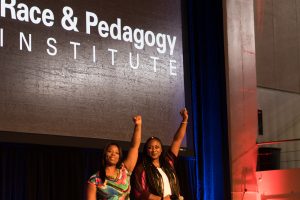
Alicia Garza & Patrisse Cullors
Two of the founders of the Black Lives Matter movement, Alicia Garza and Patrisse Cullors, gave their keynote speech to a crowded audience. They spoke separately, each touching on different elements of the Black Lives Matter movement. People lined up outside of Puget Sound’s fieldhouse early on Sept. 29 to listen to the 2018 Race and Pedagogy Conference’s final keynote.
Cullors began by acknowledging the difficulty of the weekend. Understanding the emotional burden of the Kavanaugh hearings, she created a safe space for her audience. “We believe you,” she said, giving a moment to sexual assault survivors. The room felt heavy.
Cullors focused on the creation of Black Lives Matter (BLM). She recalled learning about the death of Trayvon Martin and how his murder pushed the movement into existence. She consistently reinforced that the movement began with people. Personal relationships and passion started the movement, not social media.
Cullors also spoke about the 2016 presidential election, discussing how depressed and deflated she had felt as the results came in. She told the audience that she had considered moving, leaving the United States for Canada, but in the end stayed to pursue justice.
“I want to show my 2 ½ year old what it looks like to commit to the fight,” she said.
Cullors talked about the omnipresence of the movement: “It was not a national conversation; it was actually a global conversation,” she said.“Black Lives Matter is about all black lives.” Her statements received massive applause from a passionate and vocal audience.
“We should commit ourselves to a radical vision,” Cullors said, before handing the microphone off to Alicia Garza. While Cullors focused on the origins and the personal history behind BLM, Garza talked about power and the challenges that people face in changing systems of oppression.
“Power does not want us to be powerful,” Garza said early in her speech. She conveyed the need for a shift in power, to change how systems of power operate completely. She focused on the importance of incorporating diversity in politics, but having this diversity represent a shift in power.
“It’s not enough to be black and in a seat,” she said.“It is fundamentally about disrupting the systems that feed off of Black Lives.”
Garza ended with the idea that engaging in these movements must happen. It is not enough to be participating online; movements require real action. “This is my plea to you … we want you to engage with us critically,” Garza said. “My plea to us today is to engage in substance, not symbolism. I don’t want to be your deity. I want to be your co-conspirator.”
Many members of the community had strong reactions to Garza’s and Cullors’ speeches and also to the conference as a whole. Maija Petterson, a first-year student at Puget Sound, and her mother, Angelique Petterson, shared their ideas about the conference.
When prompted about what stood out in the Black Lives Matter keynote, Maija Petterson highlighted their ideas about power: “I think that her message on power, how we look at power and who has power impacted me.”
Maija and Angelique Petterson are from a politically conservative area of Colorado, so Angelique Petterson expressed the freedom she felt during the conference: “It’s nice to be able to talk openly and not feel nervous about the implications of my opinions,” she said.
Maija Petterson added that she liked the conference because it inspires action: “It’s easy to shut down because of what’s happening, but this conference is a way to remind myself to be powerful and that good things do happen; this struggle is something we need to go through,” she said. “It’s a way to remind myself later to be politically active, and not just to sit back.”


